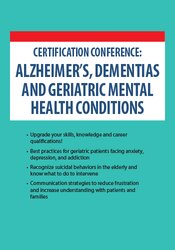
×

No matter the discipline, very few providers have received adequate training on safely and effectively meeting the complex mental and behavioral health needs of older adults.
Don’t be caught unprepared!
Whether you’re a social worker, psychologist, counselor, nurse, OT, PT, SLP, or Long-Term Care professional, this training is exactly what you need to ensure proper care for geriatric patients facing Alzheimer’s, other dementias, depression, anxiety, trauma, substance use issues, and suicidal ideation. More than a broad overview, this training will give you specific strategies and interventions tailored to older adults.
Through this specialized training you’ll receive:
Purchase today and finish feeling prepared and confident in your ability to overcome the most challenging complexities of working with geriatric patients!
Best of all, upon completion of this training, you’ll be eligible to become an Evergreen Certified Dementia Care Specialist (ECDCS) through Evergreen Certifications. Certification lets colleagues, employers, and clients know that you’ve invested the extra time and effort necessary to understand the complexities of dementia care counselling. Professional standards apply. Visit www.evergreencertifications.com/ecdcs for details.
CERTIFICATION MADE SIMPLE!
Attendees will receive documentation of ECDCS designation from Evergreen Certifications 4 to 6 weeks following completion.
*Professional standards apply. Visit www.evergreencertifications.com/ecdcs for professional requirements.
All members of the PESI, Inc. planning committee have provided disclosures of financial relationships with ineligible organizations and any relevant non-financial relationships prior to planning content for this activity. None of the committee members had relevant financial relationships with ineligible companies or other potentially biasing relationships to disclose to learners. For speaker disclosures, please see the faculty biography.
Continuing education credit information is coming soon for this non-interactive self-study package.
CEs may be available for select professions, as listed in the target audience. Hours will be dependent on the actual recording time. Please check with your state licensing board or organization for specific requirements.
There may be an additional fee for CE certificates. Please contact our Customer Service at 1-800-844-8260 for more details.
**Materials that are included in this course may include interventions and modalities that are beyond the authorized practice of your profession. As a licensed professional, you are responsible for reviewing the scope of practice, including activities that are defined in law as beyond the boundaries of practice in accordance with and in compliance with your professions standards.
| File type | File name | Number of pages | |
|---|---|---|---|
| Manual - 2-Day Certification Conference: Alzheimer's, Dementias and Geriatric Mental Health Conditions (25.2 MB) | 94 Pages | Available after Purchase | |
| Updated Handouts (31.9 MB) | 79 Pages | Available after Purchase |

Micheal Shafer Ph.D., is a clinical psychologist who specializes in the diagnosis and treatment of people with dementia. Dr. Shafer holds multiple teaching positions in the Michigan State University School of Medicine in the departments Physical Medicine and Rehabilitation and Radiology.
Dr. Shafer lectures nationally on a variety of clinical and research issues, and has conducted numerous trainings for physicians about medication utilization and mechanisms of actions, particularly for those used to treat Alzheimer's Disease. His primary research/clinical interests include the assessment of neuropsychological disorders (e.g., stroke, traumatic brain injury (TBI), Alzheimer’s) and the study of localized brain functioning. Prior to earning his Ph.D., Dr. Shafer provided hospital-based counseling services and conducted research at the University of Maryland Medical School.
Dr. Shafer earned his M.A. degree in applied psychology from the University of Baltimore and his Ph.D. in clinical psychology with an emphasis on neuropsychology from the University of North Texas.
Speaker Disclosures:
Financial: Dr. Micheal Shafer has employment relationships with Michigan Health, MSU PM&R, and PAR Rehab Services. He is the founder and president of Greater Lansing CARE Foundation. Dr. Shafer receives a speaking honorarium and recording royalties from PESI, Inc. He has no relevant financial relationships with ineligible organizations.
Non-financial: Dr. Micheal Shafer is a journal reviewer for Neuropsychology, Journal of Head Trauma, and the Journal of Primary Prevention. He is a member of the Functional Neurological Disorder Society (FNDS), the Clinical Neuropsychology (Division 40, APA), the American Psychological Association (APA), the National Academy of Neuropsychology (NAN), and the Michigan Psychological Association (MPA).
Access never expires for this product.
For a more detailed outline that includes times or durations of time, if needed, please contact cepesi@pesi.com. ** no”Access to Self Study” tab available.
Visit our FAQ page at https://www.pesicanada.ca/faq or contact us at https://www.pesicanada.ca/contact-us.
| 5 |
|
| 4 |
|
| 3 |
|
| 2 |
|
| 1 |
|
Satisfaction Guarantee
Your satisfaction is our goal and our guarantee. Concerns should be addressed to info@pesicanada.com.
Please wait ...